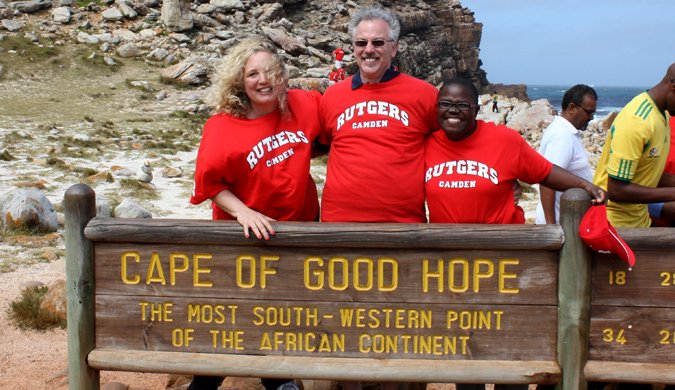
Mutcherson, with law professor Phillip Harvey, has co-taught the seminar South African Constitutional Law and a constitutional law research course, and will once again lead both classes on the spring break trip from Cape Town to Johannesburg.
On past trips, aspiring attorneys have spoken with a justice on the South African Constitutional Court (the equivalent of the United States Supreme Court); hobnobbed with law students from around the world; and met activists and advocates involved in cases they studied in class.
Traditional tourist highlights have hardly been missed: the group has climbed Table Mountain, sipped South African wine, and of course, gone on safari.
What makes South Africa’s constitution equally admirable and teachable? “South Africa has one of the youngest constitutions out there,” notes Mutcherson. “And it was written with the idea of plugging the gaps in older constitutions.”
For law students learning about the U.S. constitution, studying South Africa’s is an eye-opening experience in what American populations and protections are left out of our centuries-old document.
“Because it was born out of Apartheid, the South African constitution offers explicit protections for wide groups of people and specific rights, including proscribing discrimination on the basis of race, gender, sex, and economic status, while also allowing for affirmative action to create greater conditions of equality,” Mutcherson adds.
Uniquely, it also obligates the government to provide healthcare to its people. How this plays out in a country overwhelmed with HIV/AIDS fascinates Mutcherson, who studies health policy and teaches a course on the relationship the law has with the global epidemic.
For Prof. Harvey, a labor law expert, South Africa offers a fascinating purview into a country’s attempt to enforce economic and social rights through a court system.
“Each professor who has led the trip gravitates to issues they study and South Africa provides ample material to pursue those interests,” says Harvey, who notes his favorite stop in South Africa is at the Center for Conciliation, Mediation, and Arbitration that enforces the nation’s labor and employment laws and resolves individual disputes with employers within one month. Students on the trip get to witness this expedient process in action.
In addition, both Harvey and Mutcherson teach pivotal cases before the trip then interact with the actual attorneys involved in the litigation while visiting South Africa. Legal scholarship comes to life once again when Rutgers law students not only meet, but mingle with South Africa’s Constitutional Court Judges. For third-year law student Michael Perez, who travelled to South Africa last spring, meeting the judge was unforgettable.
“I’d be shocked if ever in my life I have a conversation with a judge of that magnitude in the U.S.,” offers Perez, president of the Rutgers Association of Public Interest Law. “Imagine being in their chambers with 20 other people talking to Justice Scalia or Justice Thomas for over an hour.”
Perez also seized on this meeting to ask questions about the South African constitution with someone who actually wrote it, something he could never do with say, James Madison. “As law students we are always asking, ‘what did the framers mean by this provision or that provision,’ but in South African we can just ask them directly.”
Rutgers–Camden’s unique relationship with South Africa originated with former dean of students Rory “Cal” Maradonna, who has travelled to the nation every year since 1996. Maradonna continues to plan the trip through the Rutgers–Camden International Studies Program, which offers for-credit and customized trips for approximately 80 students studying urban studies; political science; nursing; business; and law.
Media Contact: Cathy K. Donovan
(856) 225-6627
E-mail: catkarm@camden.rutgers.edu